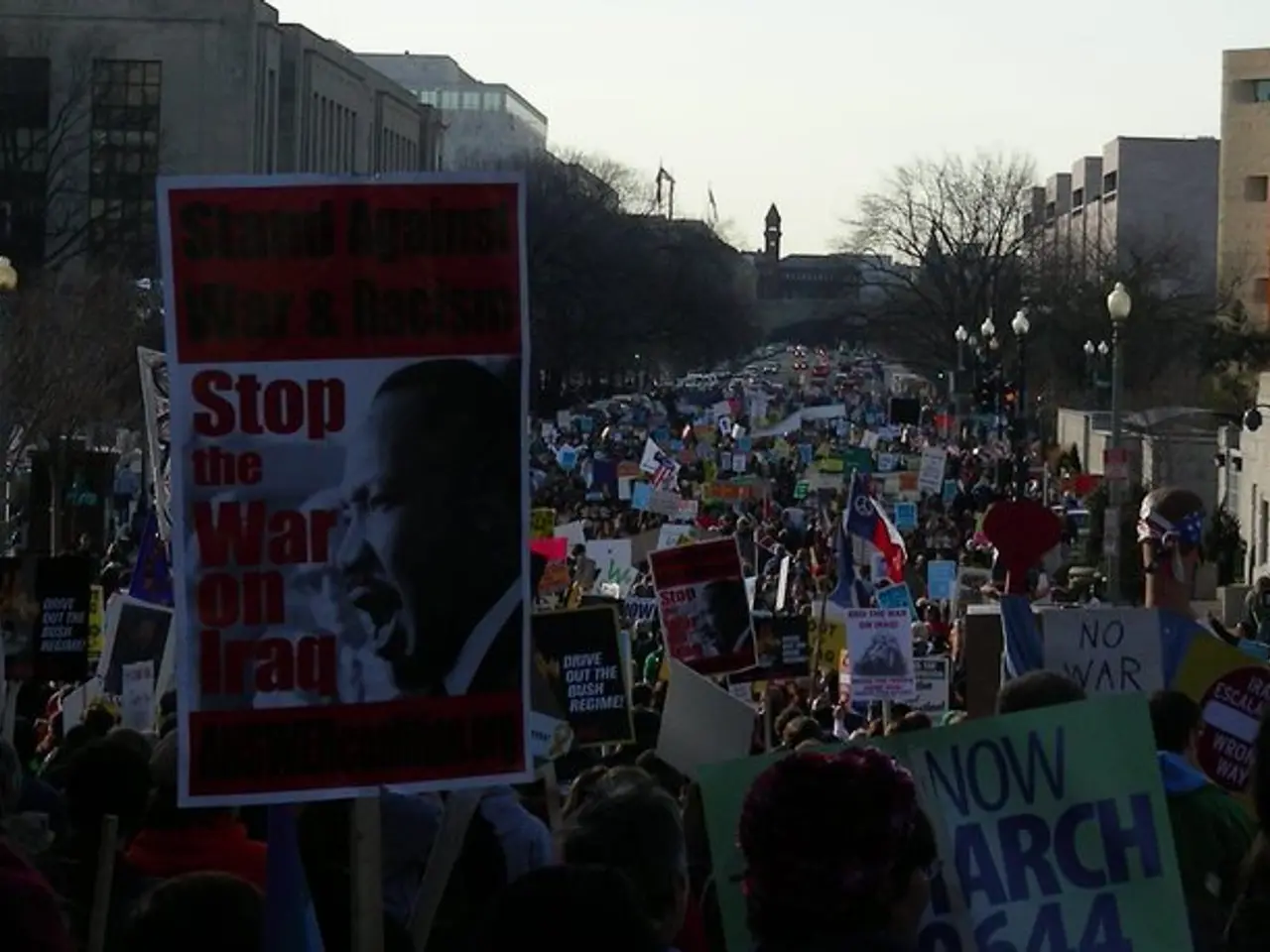Protesters rally in Eswatini, demonstrating against American deportations
In a landmark case, activists in Eswatini, the last absolute monarchy in Africa, have filed an urgent lawsuit in the High Court on August 14, 2025. The lawsuit challenges the government's secret agreement with the US government that allowed the deportation and incarceration of five foreign nationals from Vietnam, Laos, Yemen, Cuba, and Jamaica [1][3].
The lawsuit alleges that the agreement was made without public or parliamentary participation, violating section 238 of Eswatini's Constitution, and raises serious concerns about executive overreach, human rights, and national security [1]. The migrants, who have no legal or familial ties to Eswatini, are being held in solitary confinement at Matsapha Maximum Correctional Facility following their deportation from the US [3].
The prison, operating at an occupancy rate of 171%, is under scrutiny for the conditions and legality of the migrants' imprisonment. This is the first case of a Southern African Development Community (SADC) country accepting US deportees on shadow flights, which reportedly transport thousands untracked to third countries without informing families or local authorities [1].
The Eswatini government's acceptance of the US-deported migrants and the undisclosed terms of the agreement have drawn criticism for lack of transparency and adherence to constitutional and human rights norms [1]. Human rights lawyers and activists argue the deal was secretive and without proper legal or public oversight [2].
The organizations that filed the lawsuit, including the Eswatini Litigation Centre, SRWA, and SALC, stated that the circumstances surrounding the agreement with Washington to admit these individuals raise "serious concerns" regarding "human rights and national security" [1]. The Department of Homeland Security stated that the men were "so barbaric that their home countries refused to take them back" [4].
This case draws attention to emerging issues of international deportation practices and their impact on human rights in receiving countries. The US government, under President Donald Trump, had announced the deportation of five "criminal illegal immigrants" to Eswatini in mid-July [4]. In early July, the US had already deported eight migrants to South Sudan [5].
King Mswati III, who has ruled Eswatini since 1986, continues to face criticism for his lavish lifestyle and accused human rights abuses [6]. The government had not published the terms of the agreement with Washington regarding the deportation of these individuals [1].
References:
[1] "Eswatini: Activists Challenge Government over Secret US Deportation Deal." BBC News, BBC, 14 Aug. 2025, www.bbc.com/news/world-africa-58154893.
[2] "Eswatini: Activists Challenge Deportation of US Migrants." Al Jazeera, Al Jazeera, 14 Aug. 2025, www.aljazeera.com/news/2025/8/14/eswatini-activists-challenge-deportation-of-us-migrants.
[3] "Eswatini: Five Foreign Nationals Detained in Solitary Confinement." Human Rights Watch, Human Rights Watch, 14 Aug. 2025, www.hrw.org/news/2025/8/14/eswatini-five-foreign-nationals-detained-solitary-confinement.
[4] "US Deports Five 'Criminal Illegal Immigrants' to Eswatini." Reuters, Reuters, 15 July 2025, www.reuters.com/article/us-eswatini-deportation-idUSKBN25421C.
[5] "US Deports Eight Migrants to South Sudan." The Guardian, Guardian News & Media Limited, 5 July 2025, www.theguardian.com/world/2025/jul/05/us-deports-eight-migrants-to-south-sudan.
[6] "King Mswati III: The Last Absolute Monarch in Africa." BBC News, BBC, 1 Jan. 1986, www.bbc.com/news/world-africa-16229842.
- The lawsuit filed by activists in Eswatini alleges that the government's secret agreement with the US government, which led to the deportation and incarceration of foreign nationals, violates the community and employment policies, potentially infringing on human rights and national security, as it was made without public or parliamentary participation.
- This case of international deportation practices in Eswatini has brought to light the need for transparency in politics, general news, and crime-and-justice sectors, especially in war-and-conflicts situations, to ensure adherence to constitutional and human rights norms.







